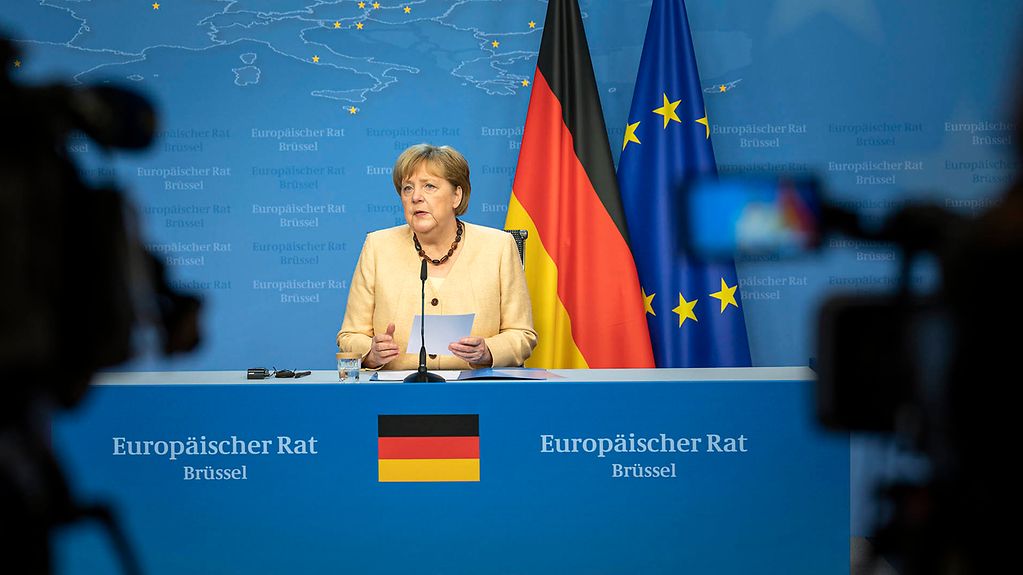European Council meeting in Brussels
Foreign policy issues were at the top of the agenda of the European Council meeting. The EU heads of state and government agreed to maintain the refugee agreement with Turkey. In the case of Russia, Federal Chancellor Merkel campaigned for a common EU communication channel. In view of the Delta variant, the member states want to work together more closely during the pandemic.
3 min reading time

“We have to do all we can to prevent a fourth wave,” said Federal Chancellor Merkel following the European Council Meeting.
Photo: Federal Government/Bergmann
Given the fact that the Delta variant has been spreading across Europe and despite rising vaccination figures, it was not the case that we were approaching the end of the pandemic, the Federal Chancellor explained following the two-day summit in Brussels. “We have to do all we can to prevent a fourth wave,” she said, and pointed out that hygiene measures and testing must continue.
Digital COVID-19 vaccination certificate is a great success
Merkel described the consensus reached regarding a digital COVID-19 vaccination certificate as a great success. With regard to virus variants, the heads of state and government agreed to work together more closely going forward. They also discussed, how vaccines for which no EMA (European Medicines Agency) approval has been granted should be handled. The Commission was asked to make a proposal for a consistent approach within the single market.
Economic recovery is well underway
The heads of state and government also spoke about economic recovery after the end of the pandemic. “I think it is fair to say that we have made it through this extraordinarily difficult situation rather well so far,” Merkel said. She continued to remark that courageous action and relatively quick reactions have helped in this respect.
She mentioned the Own Resources Decision as an example, through which Next Generation EU funds were provided to the member states. “The prospects of a quick economic recovery are good,” she said, while also pointing out that this would depend strongly on the further development of the pandemic situation, and that everything had to be done to keep case figures low and stay in control of the situation.
Migration – stronger cooperation with third states
In the context of refugee policy, the member states want to intensify cooperation with countries of origin and transit in the future. The EU Commission is going to present agreements with the individual states to the member states. These are going to provide for specific arrangements that are intended to restrict illegal migration.
EU-Turkey agreement to be maintained
Concerning Turkey, the European Council welcomed the fact that the situation in the eastern Mediterranean has improved. “We hope that this trend will continue,” Merkel said. She reported that it was now possible to move beyond the conclusions drawn by the European Council in March, and to discuss certain questions regarding the customs union.
The EU heads of state and government agreed to release further financial support to Syrian refugees in Turkey of about three billion euros. The Federal Chancellor explained that further funds are intended for Jordan and Lebanon, and that the Commission is going to present a formal paper shortly.
Difficult relations with Russia
Merkel further reports that “open discussions” took place regarding Russia: “This is all about the question of, how we can resolve our existing conflicts with Russia.” She stressed that she was convinced that it would be wise to have a common EU communication channel with Russia.
The heads of state and government did not agree to resume leaders’ talks with President Putin, as had been suggested by the Federal Chancellor and the French Prime Minister Macron. Merkel reported that formats and prerequisites for meetings would now be drawn up.
Discussion of values with Hungary
The heads of state and government discussed the controversial Hungarian law to restrict information about homosexuality with Prime Minister Orban. They clearly expressed that “tolerance and respect” were “key values of the European Union”. Federal Chancellor Merkel stressed that “it was an important discussion that we had not had before in such depth and with such openness”. The Commission would now continue to look into the Hungarian law and its contractual compliance.
Meeting with UN Secretary-General Guterres
At the start of the summit, the heads of state and government met with UN Secretary-General Guterres. The talks focussed on multi-lateral issues. Merkel reports that there had been a “high degree of consensus” between Guterres and the European Council. The Council assured Guterres that the EU member states would support the UN in all matters, whether concerning the pandemic, the 2030 Agenda, or issues relating to war and peace.